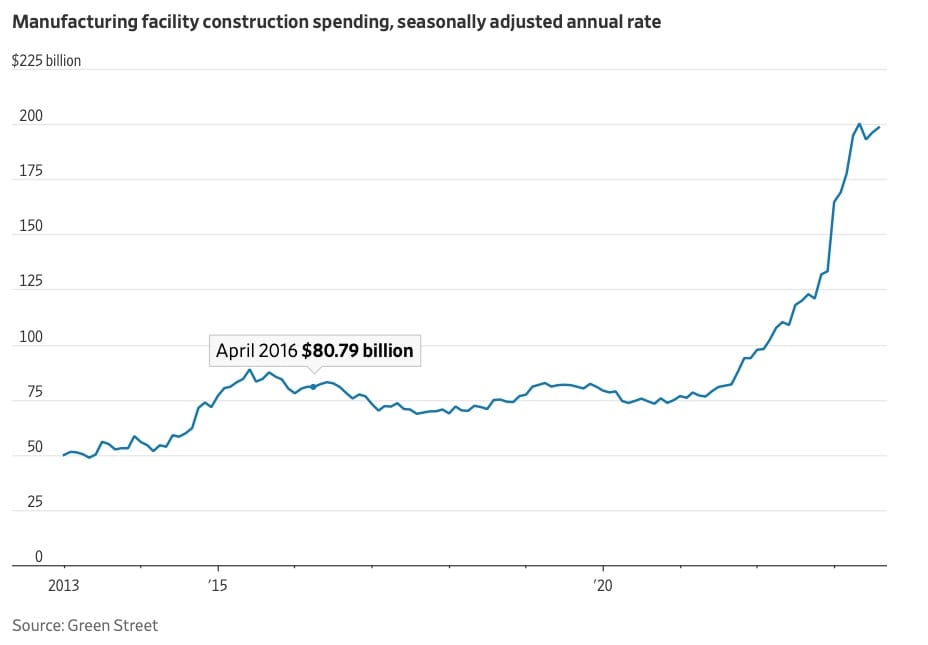September 10 2024
Manufacturing-driven real estate boom; global regulatory crackdown on Big Tech; new iPhones; diversity down after affirmative action ruling; Europe needs investment 3x bigger than Marshall Plan

FLASH Presidential debate tonight @ 9p ET
1 Manufacturing Revival Fuels Property Investment Surge Across the U.S.
2 Google Faces Federal Antitrust Battle Over Monopoly on Ad-Tech, EU Court Hands Losses to Google, Apple
3 Apple Unveils AI-Focused iPhone 16
4 Black Student Enrollment Declines at Selective Colleges Post-Affirmative Action Ruling
5 To compete with US and China, Europe needs investments more than 3x Marshall Plan: report
9/10/1897 First drunk driving arrest
See the new Ad Astra Podcast! Released on Apple and Spotify around 8a CST.
FLASH Presidential debate tonight @ 9p ET
1 Manufacturing Revival Fuels Property Investment Surge Across the U.S.
The U.S. is experiencing a manufacturing revival. More property investors are eager to capitalize on it. American and overseas companies have committed nearly half a trillion dollars to build new factories for electric vehicles, semiconductors and other products in the U.S., according to real estate analytics firm Green Street. Investors are planning to acquire or build warehouses, hotels, office buildings and apartments near coming factories across the Sunbelt and Rust Belt, where most of these so-called onshoring projects are under way. They are wagering that as new manufacturing hubs come online and create jobs they will produce a “multiplier effect,” with growing employment increasing demand for homes, shopping and more.

Article Source: WSJ
2 Google Faces Federal Antitrust Battle Over Monopoly on Ad-Tech, EU Court Hands Losses to Google, Apple
The Justice Department told a federal judge on Monday that Google had built a monopoly in lucrative technology that delivers online ads, kicking off a second federal antitrust trial against the tech giant amid mounting scrutiny of the industry. Google used its acquisition of the advertising software company DoubleClick in 2008 to dominate technology that auctions off ads on web pages as users visit, Julia Tarver Wood, the government’s lead trial lawyer, said in opening statements. Google now has an 87 percent market share in that ad-selling technology, allowing it to charge higher prices and take a bigger portion of each sale, which harms news publishers and other website owners, she said. Ultimately, Google used its size and influence to lock out competitors and rigged the rules to pad its bottom line, Ms. Wood said in the U.S. District Court for the Eastern District of Virginia. “Google is not here because they are big,” she said. “They are here because they used that size to crush competition.”
The European Union’s highest court on Tuesday delivered a major victory in the bloc’s yearslong campaign to regulate the technology industry, ruling against Apple and Google in two landmark legal cases. The decisions, issued by the Court of Justice of the European Union, were seen as an important test of efforts in Europe to clamp down on the world’s largest technology companies. Apple and Google have been frequent targets for E.U. regulators, and the companies have battled the cases for years. In the Apple case, the court sided with a European Union order from 2016 for Ireland to collect 13 billion euros, worth about $14.4 billion today, in unpaid taxes from the company. Regulators determined that Apple had struck illegal deals with the Irish government that allowed the company to pay virtually nothing in taxes on its European business in some years. In the Google case, the court agreed with the commission’s 2017 decision to fine the company €2.4 billion for giving preferential treatment in Google search results to its own price-comparison shopping service over rival offerings. Google lost an appeal in 2021.
Article Source: NYT
3 Apple Unveils AI-Focused iPhone 16
Apple unveiled the iPhone 16 on Monday as the tech giant seeks to breathe new life into its flagship product, betting that consumers will be persuaded to ditch their older devices by a steady rollout of new generative artificial intelligence features. Chief executive Tim Cook said the latest model was the first of its smartphones to be “designed from the ground up” for AI “and its breakthrough capabilities”, as audience members packed into the Steve Jobs Theater on Apple’s Cupertino campus for its annual product launch event. The iPhone 16 will go on sale on September 20 with pre-orders starting on Friday. It comes as the tech group moves to establish itself as a player in AI and revive flagging iPhone sales with new generative AI features in its latest operating system, iOS 18. Analysts, however, said the launch lacked any major surprises. Apple shares ended the day flat.
The iPhone 16, which was unveiled in a prerecorded video at the company’s futuristic Silicon Valley campus, comes in four different models that are designed to run the company’s generative artificial intelligence system, called Apple Intelligence. The company said that the phones will be able to sort messages, offer writing suggestions and use a more capable Siri virtual assistant.
Article Source: FT, NYT
4 Black Student Enrollment Declines at Selective Colleges Post-Affirmative Action Ruling
Diversity is down at some of the nation’s most selective colleges this fall. The share of Black students entering Amherst College fell to 3%, from 11% last school year. At the University of North Carolina at Chapel Hill, where students could identify themselves racially in more than one category, the percentage dropped to 7.8% from 10.5%. And at Brown University, the share of first-year domestic students who are Black fell to 9%, from 15%. The Wall Street Journal examined first-year classes at more than 20 colleges to see how class makeup is starting to change after last summer’s Supreme Court ruling barring schools from explicitly considering race in their admissions decisions. While some schools reported steady numbers, several posted sharp declines among racial minorities, including Black students in particular.
Article Source: WSJ
5 To compete with US and China, Europe needs investments more than 3x Marshall Plan: report
Growth in europe has been slowing for decades. Across different measures, a wide gap in gdp has opened up between the European Union and America. Europe’s households have paid the price in forgone living standards. On a per-person basis, real disposable income has grown almost twice as much in America as in the eu since 2000. For most of this period, slowing growth could be seen as an inconvenience but not a calamity. No more. Europe’s population is set to decline and it will have to lean more on productivity to grow. If the eu were to maintain its average productivity-growth rate since 2015, it would only be enough to keep gdp constant until around 2050. Yet Europe’s need for growth is rising. The eu is aiming to decarbonise and digitalise its economy and increase its defence capability. It must preserve its social model as its societies age. The investment needs are massive. According to the latest estimates, the investment share will have to rise by around five percentage points of gdp to levels last seen in the 1960s and 1970s. For comparison, the additional investments provided by the Marshall Plan between 1948 and 1951 amounted to around 1-2% of gdp annually. To reignite growth, the European Commission has today released a report on eu competitiveness under my leadership. This report identifies the root causes of the eu’s weakening position in key sectors and lays out a series of proposals to restore the eu’s competitive strength. It identifies three main areas for action.
Article Source: Mario Draghi
9/10/1897 First drunk driving arrest
On September 10, 1897, a 25-year-old London taxi driver named George Smith becomes the first person ever arrested for drunk driving after slamming his cab into a building. Smith later pleaded guilty and was fined 25 shillings.
Ed note: 25 shillings in 1897 would be approximately $226.56 in 2024 USD.
Sources
2. https://www.wsj.com/real-estate/sunbelt-manufacturing-boom-lures-property-investors-6b0d1988?st=djlaicaq98hpq7o&reflink=article_copyURL_share
3. https://www.nytimes.com/2024/09/09/technology/google-antitrust-ad-technology.html?smid=nytcore-ios-share&referringSource=articleShare&sgrp=c-cb; https://www.nytimes.com/2024/09/10/technology/european-union-apple-google-antitrust.html?smid=nytcore-ios-share&referringSource=articleShare
4. https://on.ft.com/3XCCDAO; https://www.nytimes.com/2024/09/09/technology/apple-event-iphone-16-watch.html?smid=nytcore-ios-share&referringSource=articleShare&sgrp=c-cb
5. https://www.wsj.com/us-news/education/the-colleges-falling-behind-on-black-student-enrollment-f3728f99?st=lbx4rif32b44wcv&reflink=article_copyURL_share
6. https://www.economist.com/by-invitation/2024/09/09/mario-draghi-outlines-his-plan-to-make-europe-more-competitive
